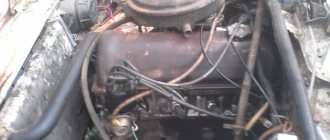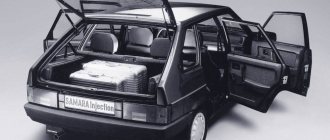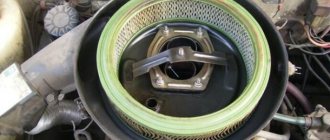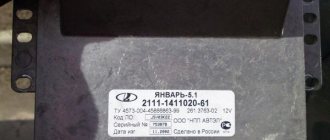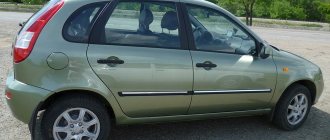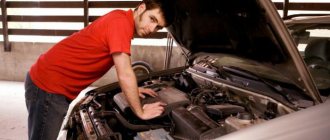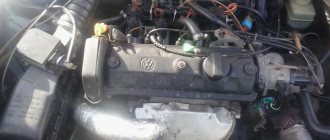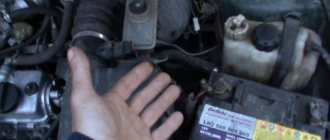Candles
First of all, find out if there is a spark at all. The weakness of the latter allows you to start the engine while it remains hot, but it does not work when it is cold.
Unscrew the spark plug, place it against ground and crank the starter. If there is a spark, then there is probably a problem in the fuel system. We will tell you about it later.
It is necessary to do otherwise when the unscrewed spark plug works properly, but it turns out to be wet. Here you should check the timing belt. The latter sometimes jumps off, which disrupts the correct gas distribution and, accordingly, the VAZ engine does not want to start.
If you see that the spark plugs are filled with fuel, then perhaps this very circumstance is preventing you from starting the engine. Dry them with a burner or on a gas stove burner. When they turn out to be wet again during the next attempt, you will have to find out why this happened.
If there is no spark, the cause is sought further. It often lies in problems:
- crankshaft pulley or sensor that controls its position (DCPV);
- computer.
In most cases, the VAZ model 2109 injector does not want to start precisely because of the failure of the DPKV. Failure of other sensors does not prevent the engine from starting, it will simply not work correctly.
First, check whether the connector leading to it is intact and whether the wires are in good condition. It is the destruction or contamination of these elements that most often interferes with the normal operation of the DPKV, while the device itself is reliable.
To test the sensor, just hold a piece of metal close to it and measure the output voltage. It will fall if the piece of iron is taken away, and rise when it is brought close.
Another reason why a VAZ may not start is the crankshaft pulley. The disadvantage of this unit is that its teeth are partially made of rubber, which means they can come off or even scroll. This affects the sensor readings, and the computer, guided by them, does not want to supply voltage to the spark plugs. It’s not difficult to check - remove the casing from the timing belt (inspect it at the same time), and then examine the pulley.
There is a high probability that there is no spark due to a faulty ignition. First you should make sure that the connector leading to it is intact. Installing a known-good module on a Lada that does not want to start will allow you to confirm your suspicions.
It is imperative to inspect all wires. A break in them, even with working devices, often leads to the inability to start the engine.
Ignition
The ignition module is a unit that comes into question after all the checks have been carried out. It is the bobbin that can become the culprit for the power unit tripping at idle or in other modes. To check the coil you need to do this:
- Unscrew the spark plug, then apply it to the ground (any part of the body).
If the spark is good, its color is of high quality, and a characteristic crackling sound is heard, then the serviceability of the reel is not questioned. On the contrary, if there is no spark, or it is of poor quality, the module must be replaced, and thus it will be possible to “cure” the tripping.
It's not very often that a switch goes bad, but it does happen. It must be checked and, if anything, replaced.
Fuel system
If there is a spark in a carburetor or injection engine, it should be assumed that the car does not start due to problems in the fuel supply system.
First make sure that gasoline is flowing into the injectors. If not, then look at the VAZ fuel pump. It is equipped with an electric motor and is located directly in the tank. Normally, when the ignition is activated, it starts to make noise.
It is advisable to find out whether the pressure in the ramp is normal. Measure it with a pressure gauge - there is a special fitting for it. Connect the device to it - if the reading is 4 atmospheres, then everything is in order. Low pressure appears due to a clogged fuel filter; this element will have to be removed and cleaned.
If there is no positive result, move on to the injectors. When they become clogged, gasoline either stops flowing altogether or its volume noticeably decreases. Moreover, it does not spray, but only drips. This problem does not make itself felt while the engine is hot. In frosty weather, the car, even if it starts moving, will still not be able to develop normal power.
In addition, fuel atomization does not occur when the computer does not open the injectors. Make sure they have all the wires and are securely attached.
Other reasons
If everything is normal with the supply and ignition system, the next culprit in the VAZ 21093 injector does not start is the timing belt. In frosty weather, when the lubricant has not yet warmed up, the shaft turns with difficulty, the belt slips and all synchronous operation of the engine is disrupted. The valve cycle is broken
.
This version can be confirmed or rejected by checking with the mark on the timing belt. If it matches, most likely the wire has broken off the sensor located on the shaft and the spark plug appears at the wrong time. However, if the sensor is in place, then the last reason remains and it is not only impossible to eliminate it on your own, but also impossible to diagnose - the electronics unit has failed. In this case, the tow rope is taken out and the car is sent to the service station.
Muffler
Sometimes an injection car does not want to start due to shedding of the catalyst in the muffler. It serves to reduce harmful emissions and is installed in accordance with current environmental legislation on all cars.
When the catalyst crumbles, the gases cannot escape normally, which means that the car will not move, since the computer will not allow it to start. It is not difficult to check this possibility - unscrew the muffler mount so that the exhaust comes directly from the resonator. If this helps, then change the catalyst.
Other problems
Both on the carburetor and on the injector, the main reason that prevents the engine from starting is problems with the starter. If it does not rotate, then you will have to figure out why. Possible breakdowns:
- winding break;
- solenoid relay failure;
- poor contact in the wiring;
- discharged battery.
Also, the car may not start due to lack of gasoline.
The ignition coil and lock will have to be checked if nothing else helps. When it turns out that the problem is in the first one, it is removed and replaced with a new one. In the second case, first of all, look to see if the wire has broken somewhere.
In the ignition system, the distributor is also a vulnerable element. Remove the cover from it - if it is damaged, replace it. You need to do the same with the slider and hall sensor.
In winter, condensation sometimes freezes in the fuel rail. Warming up with a hairdryer or blowing with a compressor helps.
What to do if your car's fuel-injected engine won't start? What to do when, when you turn the key in the ignition, the starter turns, but the engine does not start. If the engine had a carburetor, then the situation with identifying breakdowns would be a little simpler. What is the situation with injection engines?
In an area where there are a sufficient number of auto repair shops and calling a tow truck is not a problem, solving the problem is not so difficult. But what if this is not possible? After all, there are times when you have to do everything yourself. In fact, many breakdowns that prevent the engine from starting can be fixed on your own.
Compression reduction
A drop in this parameter may indicate a malfunction with the internal combustion engine or wear of its elements. Over time, valves and pistons burn out, resulting in compression.
Engine compression is directly related to throttle. The cylinder or cylinders stop working. It is noteworthy that you need to proceed to checking the compression at the very last moment, when all other possible causes have already been checked. The fact is that you will have to interfere with the installed engine system, open the engine, and only a qualified mechanic can do this. Any incorrect action can damage the power unit.
The internal elements of the engine may break, for example, if the timing chain breaks. True, this does not happen often, but the problem should not be ruled out. A compression test will help determine the condition of the pistons and rings. For example, if the readings are low during measurement, you need to pour a little oil into the cylinder and then check again. If the compression indicator increases, there is definitely a malfunction in the piston group.
Possible reasons why an injection engine does not start
Fuel system
It is necessary to diagnose the fuel supply system. In domestic fuel-injected cars, when the engine starts, you can hear a specific buzzing sound from the rear of the car. This sound indicates that the fuel pump is operating. Accordingly, if such a buzzing noise is not observed, most likely the problem lies in the pump.
You need to check the fuses that control the fuel pump, the main engine control relay and the fuel pump relay. In some cars of the VAZ family, fuses are hidden under the glove compartment, in others behind the heating panel cover on the passenger side. If the fuses are ok, check the relay.
You can touch it, and a specific click should sound. If the relay is also working properly, you need to check the pressure in the fuel system. The best way to do this is with a pressure gauge. If this is not possible, you will have to find a spool, which should be under a protective cap.
When you press it, you should feel pressure. Some models do not have a spool. Then you need to disconnect the fuel supply pipe. If the pump is working, then pressure should also be felt under your finger.
Possible causes may also be clogged fuel filters or fuel supply pipes. There may also be such a banal reason as lack of fuel in the tank.
If it turns out that all elements of the fuel system are in order, then the next thing you should pay attention to is the ignition system.
Ignition system
The main thing you need to be sure of is the presence of a good spark, that is, a discharge between the two contacts of the spark plug. If the starter turns, but the engine does not start, then there is a high probability of a malfunction in the ignition system. This is where we need our spark gap. If you check the spark plug without it, for example, by attaching it to the engine, then the resistance will be too high.
Therefore, we will not be able to accurately check our spark plugs and, in addition, the controller may be damaged. After checking the fuel system and ignition system and not finding the cause of the malfunction, you will need to check the engine. Most likely, this is the reason.
Starter malfunction
This can be a very common reason why the car engine does not start. In order to establish the possible cause of a starter failure, it is very good if the car enthusiast has at least an approximate understanding of the structure of this mechanism and how to check whether it is working.
It is important for owners of foreign cars to know that imported starters can stop turning even due to lack of lubrication or when dirty. In this case, the solution is very simple: remove the starter from the engine, thoroughly clean it from dirt and thoroughly lubricate the necessary mechanical components. Moreover, the used lubricant must be removed. In principle, this is not difficult, but if it doesn’t work out, then it’s better to contact a specialist.
Some starter malfunctions can be determined by ear. If you turn the key in the ignition switch, the starter makes a click, but it does not start, then most likely the relay is faulty. If possible, then you need to repair it. If the relay cannot be repaired, then it is worth replacing it. Only dismountable types of relays can be repaired.
Accumulator battery
The battery must be undamaged and the terminals clean and free of oxide, otherwise there will be no good contact between the battery and the vehicle's electrical wiring. The battery must have sufficient charge and “hold” it.
If the battery has been used for some time in undercharge mode, then there is a very high probability of deep discharge, in which it will no longer be able to recover.
Wiring
Corrosion may form on wiring elements or at connection points, which prevents the normal flow of current. All contact pairs must be clean and the connections insulated.
Injectors
Injectors in a car rarely fail all together and at the same time. Therefore, if there is a malfunction of one of the injectors, the engine will still be able to start and operate, albeit intermittently.
Crankshaft sensor
If this sensor is faulty, the engine will not be able to start. At the same time, the starter turns, but the engine still does not start. Failure of other sensors will not have such an impact that the engine will not start. To test the sensors, you should use a multimeter.
The start and operation of the VAZ-2109 engine is controlled by an electronic system. It processes the readings of many sensors that monitor various parameters. If any sensor fails, the injector either does not start or does not work correctly.
Elimination methods
The main reason that the engine may not gain speed is the formation of an air-fuel mixture. So, the engine does not receive the correct ratio of gasoline and air, which affects the operation of the power unit and the burning mixture does not sufficiently spin the crankshaft, which drives the wheels.
Let's look at the basic diagnostic operations and repair methods.
Bad "fuel"
First of all, it is necessary to understand what quality of gasoline is poured into the system and whether it is possible for it to burn correctly and completely. This will determine not only whether the crankshaft can spin up, but also whether the power system is clogged.
Typically, the main indicator of gasoline quality is the condition of the fuel filter. If it clogs too often, it is recommended to change the fuel supplier. To fix the problem, it is necessary to clean the entire fuel supply system, from the fuel tank to the injectors. Also, it is worth diagnosing and cleaning the piston group, where most likely the pistons already have carbon deposits.
Ignition system malfunctions
More than once, the reason that the engine does not pick up speed well has been the ignition unit. Failure of spark plugs or high-voltage wires is a direct sign of problems of various types. Carrying out diagnostic operations is quite simple. The spark plugs are unscrewed and inspected for cracks and carbon deposits.
If there is no visible damage, then it is worth checking the performance on a special spark plug stand. If inoperative spark plugs are found, it is recommended to change them, first setting the gap.
High-voltage wires are removed from the vehicle and checked using a tester. If the resistance is more or less than 5 ohms, then this is the reason.
It is worth considering the fact that high-voltage wires must be replaced in sets.
Formation of the air-fuel mixture
To form an air-fuel mixture, two things are needed - fuel and air. In this context, a blockage in one of the systems will lead to the combustible mixture being formed incorrectly, which will affect the operation of the power unit.
As for the clogging of the injection system, it is often the injectors. Usually, to cure a malfunction, it is enough to simply clean the elements, but not always. It happens that the injectors are too clogged and the elements will need to be replaced. Many car enthusiasts do not know that this part is dismountable and it is enough to change the nozzles, which have a much lower price.
Clogging of the air supply system occurs when the unit is not maintained in a timely manner. The first place to look is the air filter. In this context, not enough air enters the engine cylinders, which leads to incomplete combustion of gasoline, kinetics that are not enough to put enough pressure on the pistons and spin the crankshaft.
The next element that is recommended to be checked is the throttle valve. A clogged or jammed element can lead to the effect described above. You can clean the unit yourself using a regular carburetor cleaner.
Piston group
More than once, the cause of engine malfunction was carbon deposits in the piston group. It can be eliminated using special automotive chemicals or folk methods. But, as practice shows, this does not last long, and the engine has to be overhauled. Also, it is worth noting that carbon deposits will be not only on the piston group, but also on the valves.
A combination of factors can become the underlying cause of a malfunction and the advisability of a major overhaul.
Electronics
The only element that is almost impossible to diagnose at home is electronics. So, a malfunction of one of the sensors or malfunctions in the electronic engine control unit will lead to improper operation of the engine. To diagnose and fix the problem, you need to contact a specialist.
Often, many engine owners turn to a tuner to carry out chip tuning of the VAZ 2109 engine. This will eliminate defects in the factory firmware, as well as reduce consumption or increase the power of the power unit.
This is interesting: Window lifters on the VAZ 2107 and VAZ 2110 - we drive like a breeze!
VAZ-2109 does not start - what to do?
In general, diagnosing malfunctions of the controller (computer) and control system sensors, as well as the VAZ-2109 injector itself, is not much different from similar work for other cars. But due to the peculiarities of the “nine” control system, experienced owners of this car recommend the following solutions.
Most often, the injection “nine” does not start in winter. In this case, it is advisable to warm up and even recharge the battery - perhaps due to loss of capacity due to low temperature, it is not able to spin the engine shaft well.
Another “folk” method that helps is supplying air to the engine filter through a hairdryer. At the same time, heated air will flow into the cylinders. Many people claim that the VAZ starts right away.
Another possible reason: as a result of prolonged unsuccessful attempts to start, the spark plugs were filled with gasoline. In this case, it is recommended to try to start the car with the gas pedal pressed all the way to the floor - the spark plugs should dry out and the car will start. If this does not help, then unscrew the spark plugs and check for the presence of a spark. If it is not there, then either the spark plugs or the ignition system are faulty.
Differences between carburetor and injector breakdowns
There are common cases of engine starting failure for the injector and carburetor. But now let’s look at the distinctive features of such a malfunction as a “stalled engine”. The differences in troubleshooting are due to the different operating principles of the two systems.
The VAZ 2109 has a carburetor - the engine is driven by sucking the combustible mixture into it. This occurs due to the fact that a pressure difference is formed in the intake manifold and the atmosphere.
In this case, three components are sufficient to start the machine normally:
- gasoline;
- air;
- sparks.
The starter rotates the crankshaft, and the resulting mixture (fuel and air) is sucked into the cylinder cavity. Next, the valves of the internal combustion engine close, a compression stroke occurs, at the end of which a spark appears on the spark plug and the combustible mixture is ignited. The engine starts.
And in the case of an injector, fuel injection and the quality of the resulting mixture are controlled and adjustable. The combustible mixture is pumped into the cylinders using nozzles (directly into the combustion chamber). Therefore, there is no need to create conditions for the absorption of air and gasoline here.
A breakdown in an injection engine can be briefly described as follows: either a spark does not form, or access to the cylinders is blocked for the combustible mixture.
In addition, the VAZ 2109 injector has many sensors, an electronic control unit and an electric fuel pump. They can also fail. Let's consider the procedure for finding a breakdown separately for the carburetor and injector.
Checking injectors and timing belt
When there is a spark and its color is bright bluish, check the fuel supply: turn out the injectors and turn the engine shaft with the starter. The fuel should be sprayed from the nozzle in a uniform cone-shaped “torch”. If instead the injector pours gasoline or splashes it, then it is clogged.
If the tested components are working, then look at the timing belt. Owners of the injection “nine” have more than once encountered the situation of the belt slipping by several teeth. In winter, this can happen when starting a cold engine when the camshaft rotates heavily. To check, look at the timing mark. If it matches, check the crankshaft sensor and its wire (sometimes it comes off). Then the remaining sensors are checked.
Injectors
Due to the “high-quality” domestic fuel, injectors tend to become clogged with slag more often than is provided for by the standards for their uninterrupted operation. Checking them is as simple as checking for the presence of a spark in the candles. If you just attach the spark plugs to the engine body and turn the starter to see the presence or absence of a spark, then you can check the injector using the same principle.
It is unscrewed and the engine is cranked with the starter. The injector should produce a uniform and correct cone of gasoline flame. If gasoline is squeezed out of it drop by drop, it means it is clogged. But the injector cannot be cleaned with the same ease as a spark plug.
Diagnosis of sensor failure
Let's consider deviations in engine operation and the corresponding possible causes. Unstable operation at idle, difficult starting or stopping the engine after driving in high power mode can be caused by malfunctions of the mass air flow sensor (MAF) - it will give the controller at low speeds readings that are 15–25% higher. If there is excessive fuel consumption or the engine response has decreased, the mass air flow sensor gives underestimated readings.
Jerks and dips when switching from idle to operating speeds, even in the case of light loads, means that the operation of the sensor that reads the throttle position has been disrupted. Difficulty starting a warm engine or slight excess fuel consumption - the coolant temperature sensor has failed.
The engine picks up speed poorly and does not develop the required power, or there is a large excess fuel consumption - the knock sensor has failed or the wire from it has broken. In the event of a noticeable overconsumption of fuel with a simultaneous increase in the amount of harmful emissions in the exhaust gases, the oxygen sensor has failed.
A slight decrease in throttle response and deterioration in other engine performance characteristics means a failure of the speed sensor or oxidation of the contacts of its wires or connector. Limiting engine speed or stopping it indicates a failure of the crankshaft position sensor. Large excess fuel consumption - the phase sensor has failed. Minor deterioration in engine performance or difficult starting means the temperature sensor of the air entering the engine has failed.
If all of the above devices and sensors have been checked, but the injection VAZ-2109 does not start, then the processor may have failed and it does not properly control the entire starting system. In this case, diagnostics at a car service center is required.
Home → Device → Fuel and exhaust systems → Fuel injection system →
The problem is not new and does not lose its relevance when the VAZ 21093 injector does not start, having previously worked faithfully for several years.
The suddenness of such a situation can baffle even an experienced driver. Until 1998, while the “nine” was equipped with a carburetor engine, the problem was dealt with successfully, and there were only two reasons for not starting - a lack of gasoline and soot from the spark plugs. Since 1998, the VAZ 2109 became fuel-injected
, which began to put motorists in a certain uncomfortable position, especially those who did not use injection engines. The VAZ 21093 injector does not start for reasons, the list of which is much longer than could be compiled for the carburetor version. At first glance, it seemed that the problems should have decreased, but they only increased.
Appeal to professionals
The reasons discussed here and briefly how to eliminate them, we hope, will answer the question why the VAZ 2110 injector takes a long time to start.
Let's assume that even a non-specialist can carry out basic diagnostics of a car, but perhaps this is not enough: the causes of the malfunction can be complex, for example, in some cases there are several preconditions for delaying starting the engine. The best solution is to seek help from professionals (car service).
Often, owners of the VAZ “Nine” are faced with a problem when the car has difficulty starting in the cold. It’s worth warning right away that there could be several reasons for this. Therefore, it is better to start your search with the simplest ones, gradually moving on to more complex ones.
Content
The quantity and quality of the fuel mixture in the injector is controlled electronically. Sensors are located throughout the engine unit, the signals from which are intercepted from the microprocessor and converted to the fuel supply system. The same processor controls the mixture ignition system in the combustion chamber
.If any sensor malfunctions, the output control pulse ceases to correspond to the parameters of the normal functioning of the engine, and it refuses to work, in other words, it does not start.
Problems with starting the injector on the 2109 especially manifest themselves in winter, on cars that while away the nights in cold garages and “in an open field.” The morning for them begins with a long warm-up. However, after being in the cold
, the battery loses all its performance and requires recharging. That is why most motorists take the battery with them to a warm apartment in winter. Particularly advanced motorists place a hairdryer under the air filter, trying to supply warm air to the cylinders and give the engine “artificial respiration” - they say this can help. {banner_content}
Spark plugs are the next most likely cause of a failure to start the engine. After repeated attempts to start, they simply drown in fuel, as drivers say: the spark plugs are flooded. Experienced car enthusiasts recommend that in such a situation, press the gas pedal to the floor and turn on the ignition
, after such manipulation the spark plugs dry out and begin to produce a normal spark. Sources used:
- https://ladaprofi.ru/vaz-2109/chto-delat-esli-vaz-2109-ne-zavoditsya.html
- https://avtodvigateli.com/neispravnosti/ne-zavoditsya-inzhektornyj.html
- https://carnovato.ru/inzhektor-vaz-2109/
- https://autoflit.ru/278-ne-zavoditsya-vaz-21093-inzhektor-osnovnye-prichiny-i-sposoby-pochinki.html

